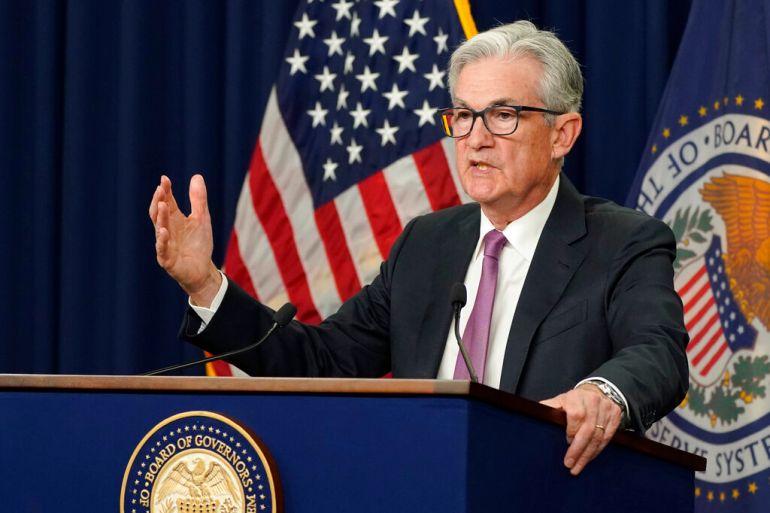US Fed hikes interest rate to highest level since 2008
Announcement sparks concern that fight to contain sky-high US inflation could tip the economy into a recession.

Intensifying its fight against chronically high inflation, the United States Federal Reserve has raised its key interest rate by a substantial three-quarters of a point for a third straight time, an aggressive pace that is heightening the risk of an eventual recession.
The Fed’s move on Wednesday boosted its benchmark short-term rate, which affects many consumer and business loans, to a range of 3 percent to 3.25 percent, the highest level since early 2008.
Keep reading
list of 3 itemsUS mortgage rates hit 6% for first time since 2008 housing crisis
US inflation slows for 2nd month but remains stubbornly high
The policymakers also signalled that, by early 2023, they expect to have further raised rates much higher than they had projected in June.
The central bank’s action followed a government report last week that showed high costs spreading more broadly through the economy, with price increases for rents and other services worsening even though some previous drivers of inflation, such as petrol prices, have eased.
By raising borrowing rates, the Fed makes it costlier to take out a mortgage or a car or business loan. Consumers and businesses then presumably borrow and spend less, cooling the economy and slowing inflation.
Fed officials have said they are seeking a “soft landing”, by which they would manage to slow growth enough to tame inflation but not so much as to trigger a recession.
Yet economists increasingly say they think the Fed’s steep rate rises will lead, over time, to job cuts, rising unemployment and a full-blown recession late this year or early next year.
Chair Jerome Powell acknowledged in a speech last month that the Fed’s moves will “bring some pain” to households and businesses. And he added that the central bank’s commitment to bringing inflation back down to its 2 percent target was “unconditional”.
Falling petrol prices have slightly lowered headline inflation, which was a still-painful 8.3 percent in August compared with a year earlier. Declining petrol prices might have contributed to a recent rise in President Joe Biden’s public approval ratings, which Democrats hope will boost their prospects in the November midterm elections.
Short-term rates at a level the Fed is now envisioning would make a recession likelier next year by sharply raising the costs of mortgages, car loans and business loans.
The economy has not seen rates as high as the Fed is projecting since before the 2008 financial crisis. Last week, the average fixed mortgage rate topped 6 percent, its highest point in 14 years. Credit card borrowing costs have reached their highest level since 1996, according to Bankrate.com.
Inflation now appears increasingly fuelled by higher wages and by consumers’ steady desire to spend and less by the supply shortages that had bedevilled the economy during the pandemic.
On Sunday, though, Biden said on CBS’ “60 Minutes” news programme that he believed a soft landing for the economy was still possible, suggesting that his administration’s recent energy and healthcare legislation would lower prices for pharmaceuticals and healthcare.
Some economists are beginning to express concern that the Fed’s rapid rate hikes – the fastest since the early 1980s – will cause more economic damage than necessary to tame inflation.
Mike Konczal, an economist at the Roosevelt Institute, noted that the economy is already slowing and that wage increases – a key driver of inflation – are levelling off and by some measures even declining a bit.
Surveys also show that Americans are expecting inflation to ease significantly during the next five years.
That is an important trend because inflation expectations can become self-fulfilling: If people expect inflation to ease, some will feel less pressure to accelerate their purchases. Less spending would then help moderate price increases.
Konczal said there is a case to be made for the Fed to slow its rate increases over the next two meetings. “Given the cooling that’s coming,” he said, “you don’t want to rush into this.”
The Fed’s rapid rate increases mirror steps that other major central banks are taking, contributing to concerns about a potential global recession.
The European Central Bank last week raised its benchmark rate by three-quarters of a percentage point. The Bank of England, the Reserve Bank of Australia and the Bank of Canada have all carried out hefty rate increases in recent weeks.
And in China, the world’s second-largest economy, growth is already suffering from the government’s repeated COVID lockdowns. If recession sweeps through most large economies, that could derail the US economy, too.